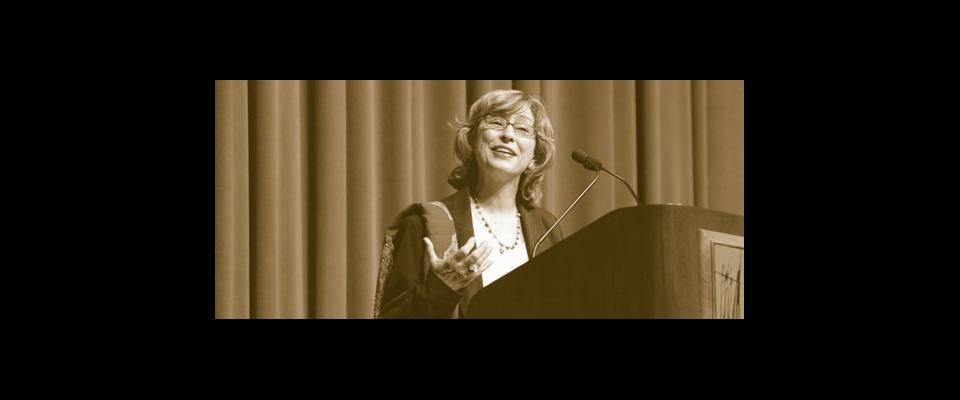When you don’t get what you want, imagine it.
There is a small fountain Azar Nafisi visits in her mind where as a 5-year-old, she would fill a cup her father had bought for that purpose, and drink. On the way to the fountain, and on the way home again, winding through the streets of suburban Tehran, Nafisi’s father would tell stories both real and imaginary. It was a ritual she treasured at the time, and one that is even more precious to her now that her father is dead and she lives in exile in the United States.
That the 50-something literature professor, now director of the Dialogue Project at The Johns Hopkins University’s School of Advanced International Studies, can continue to visit her Iranian fountain, can make out its familiar shape and hear its shivery trickle, is testament to imagination’s power to transport people. This has become a dominant theme for the author as she has worked on a follow-up to her surprise bestseller, the literary memoir Reading Lolita in Tehran, about the illicit reading group she started in her home. In the soon-to-be published The Republic of the Imagination, which Nafisi will discuss at Zellerbach Hall in December, she explores the magical places where you can retrieve what is lost.
The seven young women in Reading Lolita—shy, audacious, and hopeful—who, from the fall of 1995 until Nafisi’s exile in mid-1997, gathered in her lounge every week to discuss Fitzgerald’s Jazz Age New York, Lolita’s seduction, and Jane Austen’s feminism, were certainly citizens of the Republic of the Imagination. “Through imagination you are constantly questioning yourself and the world,” Nafisi explains from her Washington, D.C., home via telephone, her melodic voice thick with a cold. “The Republic of the Imagination transcends the restrictions that nationality, geography, or race impose on us. Imagination, one could call it a branch of knowledge. Imaginative knowledge is a way of perceiving the world, changing the world. It’s a way of living.”
Nafisi earned her Ph.D. at the University of Oklahoma in 1979 and returned to Iran to teach literature at the University of Tehran as the monarchy fell and the Islamic Republic of Iran was born. She hadn’t realized that the “glorious revolution” that brought the Ayatollah Khomeini to power would also constrict academic discourse to the point that classroom discussion of Jane Austen’s novels was considered subversive. Also subversive was the unintentional appearance of a strand of hair escaping from the chador every woman was now required to wear in public. And lipstick. There was a queasy sense that the people who celebrated the revolution, who danced in the streets to demonstrate against American imperialism, were as vulnerable as everyone else. The uprising had overtaken its supporters and they, too, might vanish one day, leaving behind a houseful of furniture and personal memorabilia, a half-eaten meal on the table.
When she first sensed the approaching information lockdown, Nafisi went to secondhand bookstores and bought up copies of such seditious titles as The Great Gatsby, A Farewell to Arms, and Huckleberry Finn, as many as she could afford. Later, she would photocopy whole books that were not otherwise available and distribute them to her students. She also rebelled by applying lashings of red lipstick, appearing in public without the veil, and embracing male friends and colleagues. Her behavior was dangerous and provocative but like so many ordinary people in Iran at the time, she was struggling to maintain her identity—her unwillingness to conform was self-protective rather than militant.
“I don’t consider myself a political person in terms of belonging to a particular political group or having a political agenda,” she says. “When I left Iran I wanted to be faithful to my own ideas. I have a set of principles, in terms of human rights, no matter where I live. In that sense I am political…. For people like me, for the majority of Iranians, this is an existential struggle. They resist certain things because it goes against their conscience—disobedience not for a political cause, but for you, the core value. I don’t want the state to decide how I should dress or how I should act.”
Students disappeared from class and it would be years before she learned of their fate: imprisonment, torture, and sometimes execution. Eventually, Nafisi was expelled from the University of Tehran for refusing to wear the veil. She returned to academia at the urging of friends and colleagues, taking positions at the Free Islamic and Allameh Tabatabai Universities, but resigned in 1995, preferring to teach seven handpicked students in her lounge with its views of the Elburz Mountains, where discussion was free-ranging, passionate, and above all, safe.
The young women were taking a risk by joining the reading group. Women in Tehran shuffled along the streets with their chadors wrapped around them like invisibility cloaks, their heads bowed and eyes trained on the ground. They never knew when a soldier might take issue with their appearance, their speech, or their posture. One of the members of the reading group was subjected to a virginity test and 25 lashes for her “Western attitudes.”
A virtual prisoner in her home, Nafisi comforted herself with books and scoops of coffee-flavored ice cream into which she stirred cold coffee and walnuts. Inevitably, thoughts turned to departure. Nafisi and her husband, Bijan, argued for months, until escape seemed like the only option. They packed their allotted eight suitcases and flew to America full of regret—for what had happened to Iran, for leaving their parents, for taking their children from their homeland. It is a regret that has not softened in 10 years, has deepened with the death of both her parents, and can never be resolved.
“I try to tell my children what I have come to believe,” she says. “It is hard not to live in the place you were born, but it is really great to live with two cultures. In a way, it is very enriching. What always scares me is this smugness, feeling too confident about where you are. Coming from another culture you are always questioning.”
Recollections of her parents and the Iran that is lost to her form the basis of another book Nafisi is working on, to be published next year. “I can never leave Iran in a sense,” she says of her imaginary visits to her homeland, “and I sometimes do have the urge to be there physically as well. That is a shame, to have a system that takes away that right from its citizens. I do wish, but you can’t have everything.”
From the November December 2007 New Media issue of California.




















